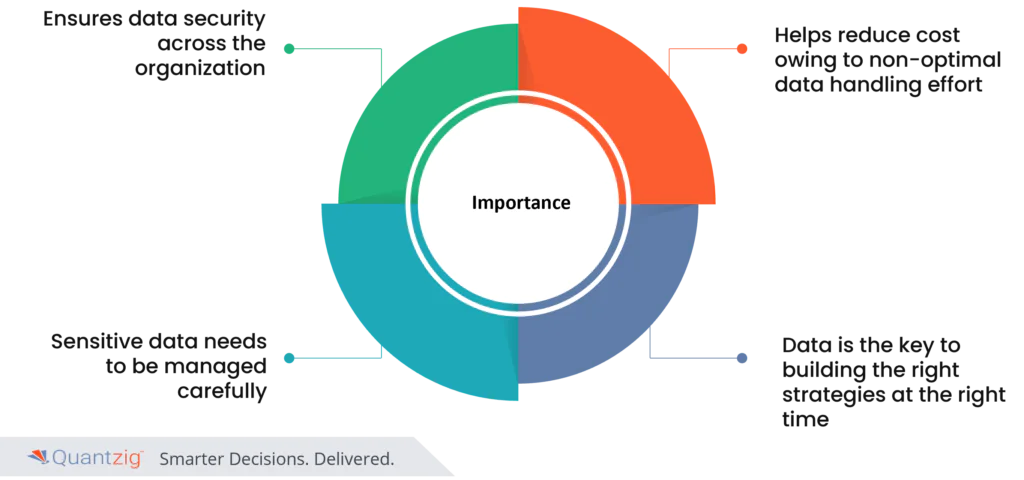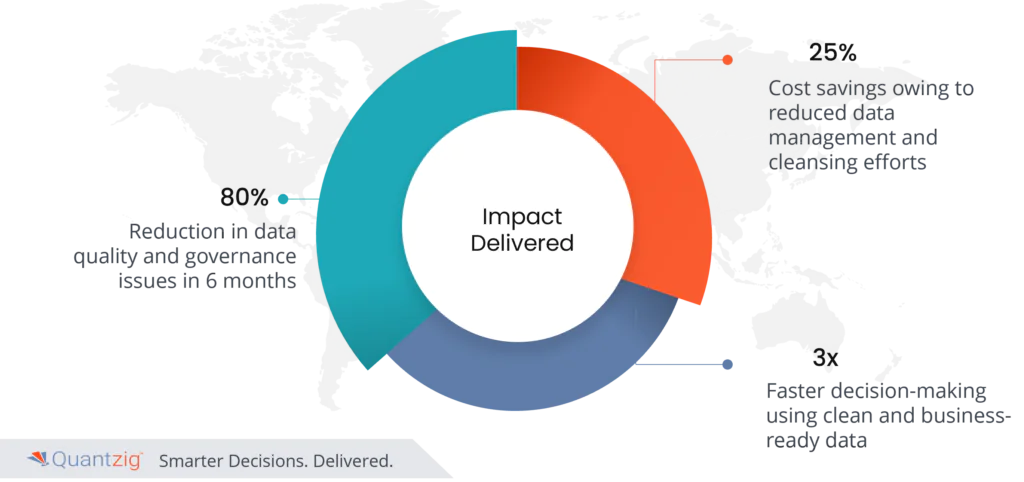Written By: Sudeshna Ghosh
In the dynamic world of business, where data reigns supreme, accuracy, reliability, and security are paramount. The synergy of data quality and governance is essential for success. Data migration, Data Migration Pipeline, Data Migration Process, Data Migration System, Regulations, ETL (Extract, Transform, Load), data integration, SQL, and NoSQL are crucial elements. IaaS (Infrastructure as a Service) and PaaS (Platform as a Service) offer diverse deployment options.
Change Data Capture ensures efficient data tracking, whether using on-premise or cloud-based tools. Business analysts and data scientists play pivotal roles in leveraging data for informed decision-making and crafting effective business strategies.Data security is a top priority, with stakeholders invested in safeguarding information. Open Source Data Quality Tools provide cost-effective solutions, while robust data governance frameworks like Snowflake Data Governance ensure effective management.
Overall, this convergence enhances efficiency, fosters compliant operations, and empowers organizations to thrive in today’s competitive landscape. By embracing a comprehensive data quality and governance strategy, businesses can unlock the full potential of their data, making informed decisions that drive operational efficiency, customer satisfaction, and overall organizational success. As the digital landscape continues to evolve, harnessing the power of this synergistic duo becomes indispensable for businesses aiming to thrive in an era where data is undeniably the cornerstone of strategic advantage.
Book a demo to experience the meaningful insights we derive from data through our data analytics tools and platform capabilities. Schedule a demo today!
Request a Free DemoTable of Contents
Importance of Data Quality & governance for your business
In the contemporary business landscape, the symbiotic relationship between data quality and governance stands as a cornerstone for success. From data migration and ETL processes to data integration using SQL and NoSQL, businesses rely on these fundamentals for operational continuity and informed decision-making.
The advent of IaaS and PaaS revolutionizes data infrastructure management, offering scalable solutions for both on-premise and cloud-based tools. Real-time Change Data Capture ensures data integrity across systems, while business analysts and data scientists leverage insights to drive effective business strategies.
As organizations navigate regulations and compliance, robust data security measures, Data Migration Pipeline, Data Migration Process, Data Migration System, Decision-making, Efficiency, Stakeholders become paramount, safeguarding information and mitigating risks. Investing in Open Source Data Quality Tools and data governance frameworks like Snowflake Data Governance ensures efficiency and resilience, empowering stakeholders to thrive in today’s dynamic marketplace.

1. Ensures data security across the organization
Data Migration, including ETL (Extract, Transform, Load) and Data Integration, is vital for organizations. Utilizing both SQL and NoSQL standards, along with IaaS (Infrastructure as a Service) and PaaS (Platform as a Service), ensures seamless transitions between on-premise and cloud-based tools.
Change Data Capture aids in maintaining data integrity, essential for Data Security and meeting Regulations. Business Analysts and Data Scientists leverage Open Source Data Quality Tools like On-premise tools, Cloud-based tools to optimize the Data Migration Pipeline, Data Migration System and enhance Efficiency in Decision-making.
Stakeholders benefit from robust Data Governance Frameworks, with Snowflake Data Governance ensuring comprehensive oversight throughout the Data Migration Process. This integration of technology and strategy drives effective Business Strategies while safeguarding organizational integrity.
2. Helps reduce cost owing to non-optimal data handling effort
Effective data governance is vital for Arcion organizations, promoting streamlined and efficient data handling processes across Cloud environments. By implementing standardized data quality measures and governance protocols, companies can minimize the risk of errors, redundancies, and inconsistencies in Data Warehouses. This proactive approach ensures Data Integrity and reduces costs associated with rectifying inaccuracies, conducting data clean-ups, and addressing operational inefficiencies. Self-scripted tools can be leveraged to automate Data Cleaning processes, improving overall Data Quality and enhancing Data Availability. Furthermore, robust Data Validation and Data Reconciliation techniques enable organizations to maintain accurate and reliable data Data Replication across various Data Sources and Data Formats. Through effective Data Mapping and Data Transformation, organizations can optimize Data Storage and ensure compatibility with different Data Types and Data Structures. This comprehensive approach not only optimizes resource utilization but also enhances overall business productivity and competitiveness through efficient Data Prefiling and management.
3. Sensitive data needs to be managed carefully
In the age of heightened data privacy concerns, businesses must navigate the intricate landscape of managing sensitive information with utmost care. Data governance frameworks provide the necessary structure to identify, classify, and handle sensitive data appropriately. This meticulous management ensures compliance with data protection regulations, builds customer trust, and shields the organization from legal consequences associated with mishandling confidential information.
Moreover, as data volume continues to grow exponentially, organizations face the challenge of ensuring the accuracy, completeness, and reliability of their data. Implementing a robust data governance strategy is essential to address these concerns effectively.
When it comes to managing data, especially during data migration projects, having a well-defined data migration plan and utilizing appropriate data migration solutions and data migration tools are crucial. These tools and solutions enhance data migration capability while ensuring the accuracy, completeness, and reliability of the migrated data.
In summary, a comprehensive data governance approach is vital for businesses to safeguard sensitive information, maintain data integrity, and navigate the complexities of managing data, particularly in the context of data migration projects and the ever-increasing data volume.
4. Data is the key to building the right strategies at the right time
Data quality serves as one of the pillars of reliable analytics, ensuring consistency and integrity in the information used for strategic decision-making. Governance complements this foundation by guaranteeing organization, security, and privacy of the data. Timely access to high-quality data empowers organizations to derive meaningful insights for their strategies and operations, enabling them to adapt swiftly to market changes and gain a competitive edge. By integrating data quality and governance into strategic planning, businesses position themselves for success, making sound decisions that align with their objectives and fostering sustained growth and resilience in an ever-evolving business landscape.
Challenges or problems faced while implementing the Data quality & governance:
1. Lack of clear strategy
One of the primary challenges in implementing data quality and governance initiatives is the absence of a well-defined and comprehensive strategy. Organizations may encounter difficulties when articulating the specific goals, priorities, and roadmap for their data governance efforts. A clear strategy is essential to align stakeholders, allocate resources effectively, and establish a cohesive framework that addresses the organization’s unique data challenges.
2. Right technology selection
Selecting the appropriate technology is a critical aspect of successful data quality and governance implementation. The market offers a myriad of solutions, and choosing the right technology that aligns with organizational requirements, scalability, and integration capabilities poses a significant challenge. The selection process demands careful consideration of current and future needs, compatibility with existing systems, and the ability to accommodate evolving data governance standards.
3. Data Privacy and security concerns
The growing emphasis on data privacy regulations poses a considerable obstacle to effective data quality and governance implementation. Organizations face the challenge of navigating complex legal frameworks, ensuring compliance with stringent privacy laws, and protecting sensitive information. Striking the right balance between data accessibility and security requires robust policies, technologies, and ongoing vigilance to mitigate potential risks and liabilities.
4. Data Ownership and accountability
Establishing clear lines of data ownership and accountability within an organization is a persistent challenge. Determining who is responsible for data quality, governance, and decision-making can be complex, leading to ambiguity and potential lapses. Assigning ownership roles, defining responsibilities, and fostering a culture of accountability are essential components in overcoming this challenge and ensuring that data management is a shared responsibility across the organization.
5. Data diversity, siloes, and individual complexities
The presence of diverse data sources, organizational siloes, and individual complexities within different departments can impede the seamless implementation of data quality and governance initiatives. Integrating disparate data sets, breaking down silos, and addressing the unique complexities of varied business units require a concerted effort. Organizations must foster collaboration, promote standardized data practices, and implement governance frameworks that accommodate the diverse nature of data across the enterprise.
Experience the advantages firsthand by testing a customized complimentary pilot designed to address your specific data analytics requirements. Pilot studies are non-committal in nature.
Request a Free PilotBenefits of implementing the Data quality & governance:
- High-quality data ensures accurate decision-making:
Implementing robust data quality measures guarantees that organizational decisions are grounded in accurate and reliable information. This enhances the precision of decision-making processes, fostering a culture of well-informed choices that significantly contribute to the overall success and strategic advancement of the organization.
- Data governance standardizes processes for efficiency:
Data governance initiatives play a pivotal role in standardizing data across the organization, reducing errors, and eliminating redundancies. This standardization leads to more efficient and streamlined business processes, optimizing resource utilization and bolstering operational effectiveness.
- Accurate data enhances customer understanding:
Reliable and accurate data empowers organizations to gain a profound understanding of their customers. This insight facilitates the delivery of personalized services, improves customer interactions, and ultimately elevates customer satisfaction levels, fostering loyalty and positive brand perception.
- Ensuring compliance with data protection regulations:
Data governance is instrumental in ensuring that organizations adhere to various data protection and privacy regulations. This commitment to compliance mitigates the risk of legal issues, fines, and reputational damage, safeguarding the organization’s standing in an increasingly regulated business environment.
- Proactive risk identification and management:
Effective data governance practices enable organizations to identify and manage data-related risks proactively. By addressing these risks before they escalate, organizations can prevent potential issues and minimize the impact of unforeseen events, enhancing overall risk management capabilities.
- Minimizing costs through error prevention:
Poor data quality often results in costly errors, rework, and inefficiencies. Implementing data quality and governance measures acts as a preventive mechanism, minimizing costs by averting errors and ensuring that organizational resources are utilized more efficiently.
- Reliable data for strategic planning and forecasting:
Organizations with high-quality data can confidently engage in strategic planning and forecasting. Reliable data allows for the accurate projection of future trends, identification of opportunities, and the formulation of decisions that align with long-term objectives, fostering a proactive and forward-thinking organizational approach.
- Critical role of high-quality data in emerging technologies:
As organizations embrace new technologies such as artificial intelligence and machine learning, the significance of high-quality data becomes paramount. These advanced technologies depend on accurate and representative data for optimal performance, emphasizing the crucial role of data quality in technological innovation.
- Accountability through data governance:
Data governance assigns clear roles and responsibilities for managing and maintaining data quality. This accountability ensures that data-related tasks are executed effectively, preventing issues caused by neglect or oversight and reinforcing a culture of responsibility within the organization.
- Contributing to long-term organizational sustainability:
Establishing robust data governance practices contributes to the long-term sustainability of the organization. It lays the foundation for effective data management, ensuring that data remains a valuable asset as the organization evolves, adapts to changes, and continues to thrive in a dynamic business landscape.
Get started with your complimentary trial today and delve into our platform without any obligations. Explore our wide range of customized, data driven analytical solutions built across the analytical maturity levels.
Start your Free TrialSuccess Story:
Challenges faced by the client:
The client confronted challenges stemming from diverse data sources across geographies, complicating the integration and standardization processes. Handling sensitive information fell short of ideal norms, posing risks to data privacy and compliance. Additionally, tracking data management lapses proved challenging across teams, giving rise to issues related to accuracy, consistency, and overall data quality. Addressing these obstacles required a holistic approach, encompassing comprehensive data governance frameworks, standardized protocols, and enhanced collaboration among teams to ensure uniformity, security, and adherence to best practices in managing diverse and sensitive data.
Solutions offered by QZ:
- Consultative Engagement and Issue Identification:
Quantzig initiated a comprehensive consultative engagement, meticulously identifying common data quality and governance issues. Through this process, the team conducted a thorough analysis of the client’s data landscape, pinpointing areas of concern and formulating a precise blueprint for targeted data management solutions. This approach ensured a clear understanding of the client’s unique challenges, laying the foundation for tailored strategies to enhance data quality and governance.
- Execution of Quality and Governance Business Rules with Process Centralization:
Following the consultative phase, Quantzig executed a strategic plan to implement quality and governance business rules. This involved the deployment of centralized business processes designed to fortify data management, ensuring adherence to established standards. By consolidating these processes, our team not only addressed immediate concerns but also provided the client with a robust framework to prevent future breaches, fostering sustained data quality and governance excellence.
Impact Delivered

- 80% reduction in data quality and governance issues in 6 months;
- 25% cost savings owing to reduced data management and cleansing efforts;
- 3x faster decision-making using clean and business-ready data
In conclusion, the symbiotic relationship between data quality and governance emerges as an indispensable asset for business success. Through meticulous standardization, proactive risk management, and strategic decision-making, this dynamic duo fortifies an organization’s foundation, ensuring accuracy, compliance, and optimal resource utilization. As data continues to evolve in complexity and importance, embracing a comprehensive approach to data quality and governance becomes not only a necessity but a strategic imperative.
The ability to navigate diverse data landscapes, mitigate risks, and capitalize on the power of reliable information positions businesses to not only thrive in the present but also to shape a resilient and future-proofed foundation. In this era of data-driven decision-making, the investment in data quality and governance proves to be a pivotal driver of operational excellence, customer satisfaction, and sustained growth.
“Empower your business with the winning duo of Data Quality & Governance—ensuring accuracy, compliance, and strategic excellence. Elevate your operations to new heights by investing in the backbone of successful decision-making and sustained growth.”



